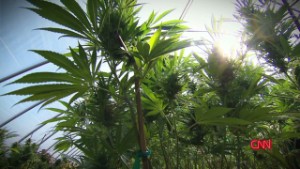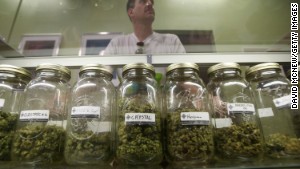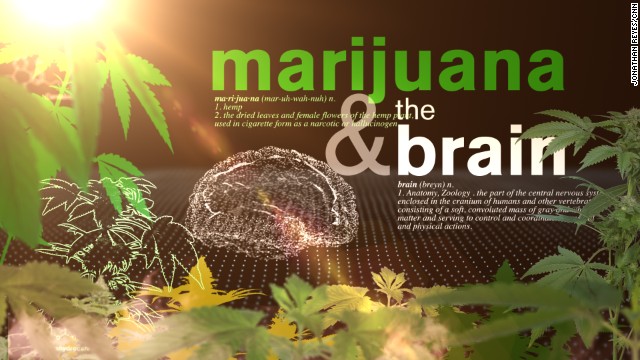As Colorado continues to reap the tax benefits of Recreational Marijuana Legalization, $2M in January alone...
CNN's Dr Sanjay Gupta "Doubles Down" on the Medicinal Attributes of Cannabis.
Are we turning the corner on Federal Legalization?
We shall see...
#WIcannaBIZ
Don't miss "Weed 2: Cannabis Madness: Dr. Sanjay Gupta Reports" at 10 p.m. ET Tuesday. Also, Gupta will be answering your questions on Reddit at noon ET.
Medical marijuana and 'the entourage effect'
updated 10:53 AM EDT, Tue March 11, 2014
STORY HIGHLIGHTS
- Scientist Raphael Mechoulam has made studying marijuana his life's work
- There are more than 480 natural components in the cannabis plant
- "The entourage effect" means those components may work best together
Don't miss "Weed 2: Cannabis Madness: Dr. Sanjay Gupta Reports" at 10 p.m. ET Tuesday. Also, Gupta will be answering your questions on Reddit at noon ET.
(CNN) -- In the early 1960s, a young postdoctoral student stumbled onto something that puzzled him.
After reading the
literature on cannabis, he was surprised to see that while the active
compound in morphine had been isolated from opium poppies 100 years
before and cocaine isolated from coca leaves around the same time, the
active component of marijuana was still unknown.
This simple observation launched his life's work.
That young Israeli
researcher, Raphael Mechoulam, is now a heavily decorated scientist,
recently nominated for the prestigious Rothschild Prize. More than 50
years ago, however, he had trouble starting his scientific journey.

Dr. Sanjay Gupta is a practicing neurosurgeon and CNN's chief medical correspondent.
For starters, he needed cannabis to study and didn't know how to obtain it. Eventually, he obtained his research supply from friends in the police department. The young scientist was in a hurry, and didn't want to wait to cut through the red tape required by Israel's Health Ministry.
"Yes, I broke the law,"
he told me when I met with him in Tel Aviv last year, "but I apologized
and explained what I was trying to do."

Dr. Gupta: 'You get a distorted picture'

Doctor: Weed is not a 'gateway drug'
It's a good thing the Israeli government didn't stall his progress, because Mechoulam was moving at breakneck speed.
By 1963, he determined
the structure of cannabidiol (CBD), an important component of marijuana.
A year later, he became the first person to isolate delta-9
tetrahydrocannabinol (THC), the psychoactive ingredient in marijuana.
Over the ensuing decades, Mechoulam and his team continued to isolate
numerous compounds from the cannabis plant.
Their work also went a
long way toward illuminating how the drug works in the brain. When
Mechoulam's team identified the first known endogenous cannabinoid, a
chemical actually made by the brain itself, he named it "anandamide." In
the Sanskrit language, ananda means "supreme bliss," which gives us
some insight into what Mechoulam thinks of cannabinoids overall.
It was halfway through
our long afternoon discussion that Mechoulam, now 83, pulled out a paper
he had written in 1999, describing something known as "the entourage
effect."
Think of it like this:
There are more than 480 natural components found within the cannabis
plant, of which 66 have been classified as "cannabinoids." Those are
chemicals unique to the plant, including delta-9-tetrahydrocannabinol
and cannabidiols. There are, however, many more, including:
-- Cannabigerols (CBG);
-- Cannabichromenes (CBC);
-- other Cannabidiols (CBD);
-- other Tetrahydrocannabinols (THC);
-- Cannabinol (CBN) and cannabinodiol (CBDL);
-- other cannabinoids (such as cannabicyclol (CBL), cannabielsoin (CBE), cannabitriol (CBT) and other miscellaneous types).
Other constituents of
the cannabis plant are: nitrogenous compounds (27 known), amino acids
(18), proteins (3), glycoproteins (6), enzymes (2), sugars and related
compounds (34), hydrocarbons (50), simple alcohols (7), aldehydes (13),
ketones (13), simple acids (21), fatty acids (22), simple esters (12),
lactones (1), steroids (11), terpenes (120), non-cannabinoid phenols
(25), flavonoids (21), vitamins (1), pigments (2), and other elements
(9).
Here is the important
point. Mechoulam, along with many others, said he believes all these
components of the cannabis plant likely exert some therapeutic effect,
more than any single compound alone.
While science has not
yet shown the exact role or mechanism for all these various compounds,
evidence is mounting that these compounds work better together than in
isolation: That is the "entourage effect."
Take the case of Marinol, which is pure, synthetic THC. When the drug became available in the mid-1980s, scientists thought it would have the same effect as the whole cannabis plant. But it soon became clear that most patients preferred using the whole plant to taking Marinol.
Researchers began to realize that other components, such as CBD, might have a larger role than previously realized.
To better understand the
concept of the entourage effect, I traveled to the secret labs of GW
Pharmaceuticals, outside London. In developing Sativex, a cannabis-based
drug to treat multiple sclerosis, the company's chairman, Dr. Geoffrey Guy, told me the company ran into some of the same obstacles that Marinol faced.
More than a decade of
experiments revealed that a whole plant extract, bred to contain roughly
the same amounts of THC and CBD in addition to the other components in
the plant, was more effective in reducing the pain and spasms of MS than
a medication made of a single compound.
It could be that
multiple individual compounds play a role, or it could be due to their
interaction in the body; it could also be combination of both, Guy said.
Now, maybe this all
sounds obvious. After all, eating real fruits, vegetables and other
plants provides better nutrition than just taking vitamin pills with one
nutrient or mineral in each. Science is showing us that we can likely
say the same about cannabis.
As we move forward with creating medicines, like Charlotte's Web, for the patients who can benefit from cannabis -- this is an important point to keep in mind.
Unlike other drugs that
may work well as single compounds, synthesized in a lab, cannabis may
offer its most profound benefit as a whole plant, if we let the
entourage effect flower, as Mechoulam suggested more than a decade ago.
 |
| Colorado made roughly $2 million in marijuana taxes in January, state revenue officials reported Monday.... Read more |
A cool $2 million in taxes for Colorado’s first month of recreational pot
Published:Colorado collected slightly more than $2 million in taxes on the sale of recreational marijuana in the month of January, according to new figures released by the state Monday.
The numbers are the first time an official tally has been put on the value of the historic January sales. But they are also below the amounts that previous estimates have predicted Colorado could reap from the sale of marijuana to anyone 21 and older.
Related: Check out Colorado’s previous estimates on marijuana sales, taxes
In January, Colorado collected $1.4 million from a special 10 percent sales tax on recreational marijuana, plus another $416,690 from the state’s standard 2.9 percent sales tax, according to a news release Monday from the Colorado Department of Revenue. Extrapolating from those figures, it means recreational marijuana businesses that submitted tax returns in January did slightly more than $14 million in retail sales during the month.
Recreational marijuana businesses paid another $195,318 in excise tax during January, which will be put toward school construction.
Sales at medical marijuana businesses generated another $913,519 in sales tax for the state during January.
In total, 59 recreational marijuana businesses filed returns in January, according to the news release. Twenty-four businesses were approved to be open for sales on Jan. 1, according to the release.
Where’s the nearest pot shop? Find out via our handy map of medical and recreational sellers
That marks just a fraction of the eventual size possible for Colorado’s recreational marijuana industry. As of the end of February, state officials have given approval to 167 stores for recreational sales, though not all of those stores will have received the necessary local approval also needed to open.
Still, the January revenue figures put the industry on pace to come in below previous estimates. Both Gov. John Hickenlooper’s budget office and legislative analysts have predicted recreational sales for the first six months of 2014 would top $190 million. Instead, if January’s figures hold, sales for the period would hit only $84 million.
Excise taxes — paid on the wholesale price when marijuana is transferred between the grower and the seller — are also running behind predictions.
Hickenlooper has proposed putting the money from recreational marijuana taxes toward drug-addiction treatment and youth drug-use prevention. Lawmakers, who are currently setting next fiscal year’s budget, have said they want to wait for more numbers before making a final decision.
John Ingold:
 303-954-1068, jingold@denverpost.com or twitter.com/john_ingold
303-954-1068, jingold@denverpost.com or twitter.com/john_ingoldThis story was first published on DenverPost.com
Source Report:
http://www.cnn.com/2014/03/11/health/gupta-marijuana-entourage/
http://www.thecannabist.co/2014/03/10/cool-2-million-taxes-colorados-first-month-recreational-pot/6535/
MP Off Grid Living/EV Page
 | |
| fb: Madtown Preppers Page +Madtown Preppers @MadtownPreppers |
Madtown Preppers Alerts are for informational use only. These
alerts purpose is to inform you of news events in order for you to
adjust your family preparedness programs. We believe that
knowledge is power and in order for you to make informed
decisions, we try and bring you verified information, not to
increase fear but to inform you. We do not endorse any of the
sources we link to in any article.



No comments:
Post a Comment